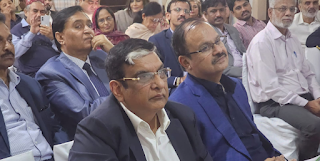Tharparkar's mental health conundrum: Awareness and education key
By Mukhtar Alam
KARACHI: A staggering 70% of people surveyed in
Tharparkar, Sindh, believe that mental illness is contagious, according to a
research study conducted by the Sindh Mental Health Authority (SMHA). The
study, which aimed to assess the knowledge, attitude, and practices (KAP) of
mental health among Tharparkar residents, revealed alarming misconceptions and
a lack of awareness about mental health issues.
The research team, led by Dr Abduk Razzaque Nohri of the Sindh Health Department, presented their findings at a ceremony held at the PMA House in Karachi on December 11. The study involved 5,378 respondents from all seven talukas of Tharparkar and was conducted over a period of three months. Dr Mahesh Kumar Malani, a member of the National Assembly and chairman of the National Health Services Regulation and Coordination committee, Islamabad, presided over the event, with Vice Chancellor of Dow University of Health Sciences (DUHS) Prof Dr Mohammad Saeed Qureshy as chief guest.
Key findings
According to the study, 60% of respondents believed that mental illnesses are treatable, while 24% thought that they can be treated through religious or faith healings. Furthermore, 26% of participants attributed mental illnesses to family events or conflicts, followed by stress (19%), God's punishment (12%), and other factors. The study also revealed that 52.5% of surveyed people demonstrated awareness about mental health issues, but 53% showed poor knowledge of mental illness. Additionally, 64% of participants exhibited an unfavorable attitude towards mental health, and 63% demonstrated unfavorable practices.
Barriers to mental health services
The researchers identified several barriers to seeking
mental health services, including financial constraints and lack of awareness.
As many as 28% of participants cited these factors as hindrances to seeking
treatment. Moreover, 82% of respondents associated stigma and shame with having
a family member diagnosed with a mental illness, while 88% feared interacting
with individuals with mental health conditions. In terms of education, the
researchers found that 46% of respondents were uneducated, followed by those
with primary education (30.2%), secondary education (19%), and graduate-level
education (5.1%). The participants' ages ranged from 18 to 75 years.
The study's findings highlight the urgent need for increased awareness and education about mental health issues in Tharparkar and beyond. The researchers emphasized the need for targeted mental health awareness campaigns, culturally sensitive education, and improved mental health services to reduce stigma and increase access to better mental healthcare for the people of Tharparkar.
The study was a joint effort by SMHA, Liaquat University of Medical and Health Sciences, Thar Foundation, SCJ Institute of Psychiatry and Behavioural Sciences. Dignitaries, including DUHS VC Dr Saeed Qureshy, MNA Mahesh Kumar, and SMHA Chairman Dr Karim A Khowaja, called for comprehensive and holistic schemes to address mental health disorders, which are now common across the country.

Graphics: SMHA







Comments
Post a Comment